Legal Aspects of Responsible Leadership: Contract Law Analysis
VerifiedAdded on 2022/08/12
|8
|2174
|13
Report
AI Summary
This report analyzes the legal aspects of responsible leadership, specifically focusing on contract law principles within a business context. Part A delves into the fundamental elements of a valid contract: offer, acceptance, consideration, and intention to create legal relations. It explores these elements through case law examples like Gunthing v Lynn, Harvey v Facey, and Balfour v Balfour, providing a clear understanding of their application. The report then applies these principles to a scenario involving Simon, a TV show producer, and Kim, a prospective legal advisor, analyzing how a valid contract can be formed. Part B addresses whether Simon can make Kim's employment conditional upon her passing final exams, explaining conditional contracts and their implications within employment law. It clarifies the difference between conditional and unconditional job offers, emphasizing the employer's rights and limitations in such agreements, using cases like Jones v Daniel to support the analysis. The report concludes by summarizing the key legal considerations for Simon, providing practical advice on contract formation and conditional employment offers.

0
The legal aspect of Responsible Leadership
2/28/2020
Student’s Name
The legal aspect of Responsible Leadership
2/28/2020
Student’s Name
Paraphrase This Document
Need a fresh take? Get an instant paraphrase of this document with our AI Paraphraser

The legal aspect of responsible leadership
1
Contents
Part A...............................................................................................................................................1
Part B...............................................................................................................................................4
References........................................................................................................................................6
1
Contents
Part A...............................................................................................................................................1
Part B...............................................................................................................................................4
References........................................................................................................................................6
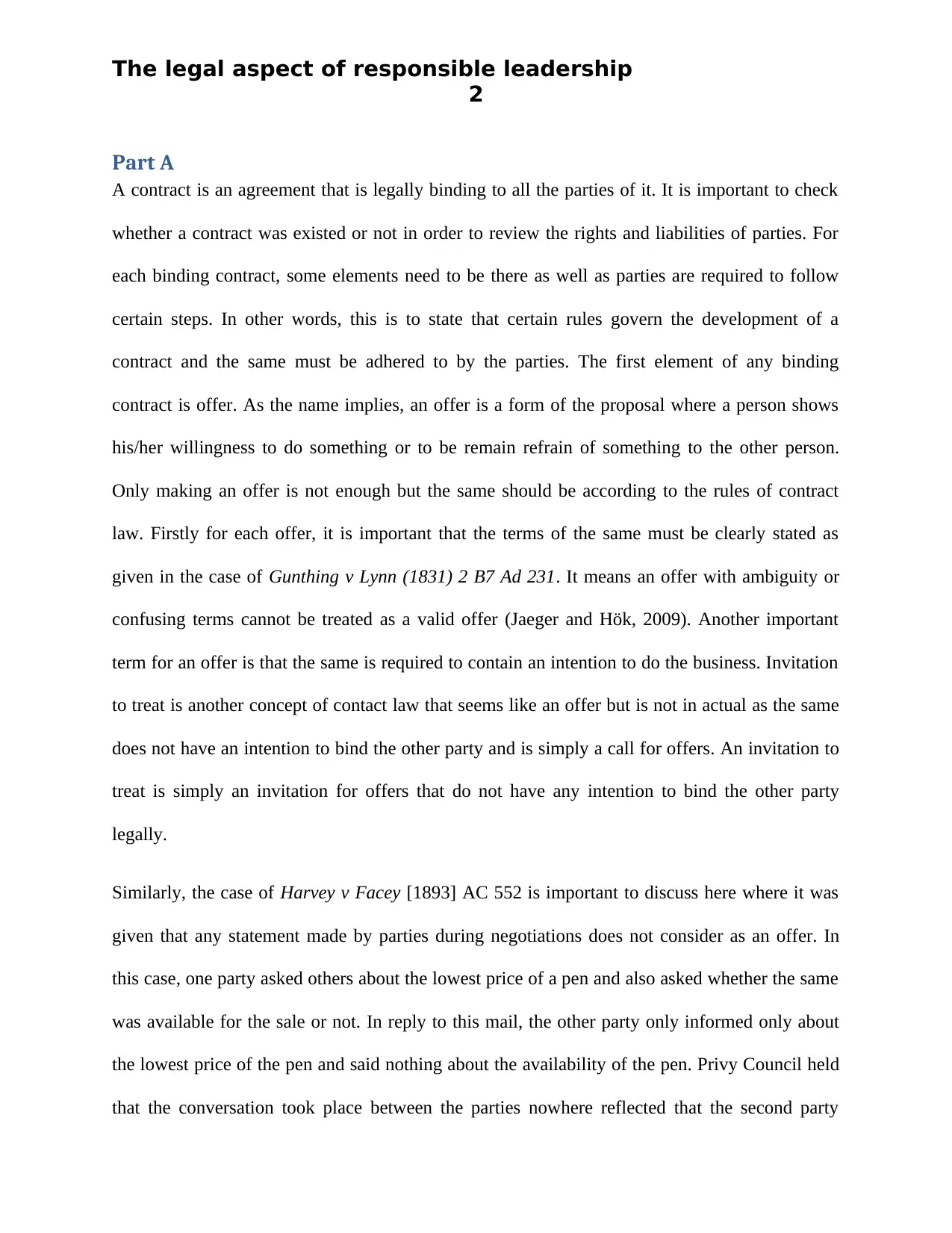
The legal aspect of responsible leadership
2
Part A
A contract is an agreement that is legally binding to all the parties of it. It is important to check
whether a contract was existed or not in order to review the rights and liabilities of parties. For
each binding contract, some elements need to be there as well as parties are required to follow
certain steps. In other words, this is to state that certain rules govern the development of a
contract and the same must be adhered to by the parties. The first element of any binding
contract is offer. As the name implies, an offer is a form of the proposal where a person shows
his/her willingness to do something or to be remain refrain of something to the other person.
Only making an offer is not enough but the same should be according to the rules of contract
law. Firstly for each offer, it is important that the terms of the same must be clearly stated as
given in the case of Gunthing v Lynn (1831) 2 B7 Ad 231. It means an offer with ambiguity or
confusing terms cannot be treated as a valid offer (Jaeger and Hök, 2009). Another important
term for an offer is that the same is required to contain an intention to do the business. Invitation
to treat is another concept of contact law that seems like an offer but is not in actual as the same
does not have an intention to bind the other party and is simply a call for offers. An invitation to
treat is simply an invitation for offers that do not have any intention to bind the other party
legally.
Similarly, the case of Harvey v Facey [1893] AC 552 is important to discuss here where it was
given that any statement made by parties during negotiations does not consider as an offer. In
this case, one party asked others about the lowest price of a pen and also asked whether the same
was available for the sale or not. In reply to this mail, the other party only informed only about
the lowest price of the pen and said nothing about the availability of the pen. Privy Council held
that the conversation took place between the parties nowhere reflected that the second party
2
Part A
A contract is an agreement that is legally binding to all the parties of it. It is important to check
whether a contract was existed or not in order to review the rights and liabilities of parties. For
each binding contract, some elements need to be there as well as parties are required to follow
certain steps. In other words, this is to state that certain rules govern the development of a
contract and the same must be adhered to by the parties. The first element of any binding
contract is offer. As the name implies, an offer is a form of the proposal where a person shows
his/her willingness to do something or to be remain refrain of something to the other person.
Only making an offer is not enough but the same should be according to the rules of contract
law. Firstly for each offer, it is important that the terms of the same must be clearly stated as
given in the case of Gunthing v Lynn (1831) 2 B7 Ad 231. It means an offer with ambiguity or
confusing terms cannot be treated as a valid offer (Jaeger and Hök, 2009). Another important
term for an offer is that the same is required to contain an intention to do the business. Invitation
to treat is another concept of contact law that seems like an offer but is not in actual as the same
does not have an intention to bind the other party and is simply a call for offers. An invitation to
treat is simply an invitation for offers that do not have any intention to bind the other party
legally.
Similarly, the case of Harvey v Facey [1893] AC 552 is important to discuss here where it was
given that any statement made by parties during negotiations does not consider as an offer. In
this case, one party asked others about the lowest price of a pen and also asked whether the same
was available for the sale or not. In reply to this mail, the other party only informed only about
the lowest price of the pen and said nothing about the availability of the pen. Privy Council held
that the conversation took place between the parties nowhere reflected that the second party
⊘ This is a preview!⊘
Do you want full access?
Subscribe today to unlock all pages.

Trusted by 1+ million students worldwide
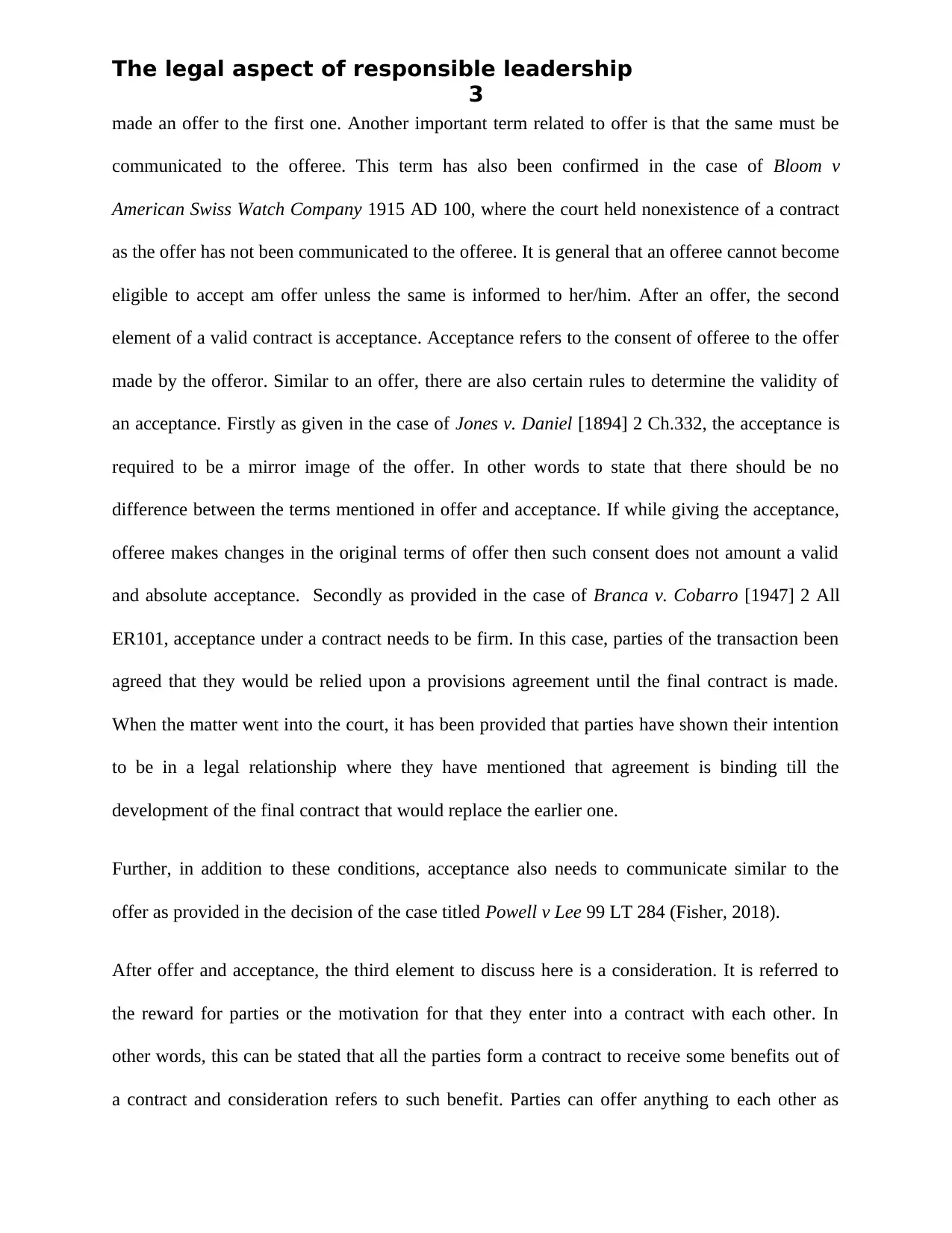
The legal aspect of responsible leadership
3
made an offer to the first one. Another important term related to offer is that the same must be
communicated to the offeree. This term has also been confirmed in the case of Bloom v
American Swiss Watch Company 1915 AD 100, where the court held nonexistence of a contract
as the offer has not been communicated to the offeree. It is general that an offeree cannot become
eligible to accept am offer unless the same is informed to her/him. After an offer, the second
element of a valid contract is acceptance. Acceptance refers to the consent of offeree to the offer
made by the offeror. Similar to an offer, there are also certain rules to determine the validity of
an acceptance. Firstly as given in the case of Jones v. Daniel [1894] 2 Ch.332, the acceptance is
required to be a mirror image of the offer. In other words to state that there should be no
difference between the terms mentioned in offer and acceptance. If while giving the acceptance,
offeree makes changes in the original terms of offer then such consent does not amount a valid
and absolute acceptance. Secondly as provided in the case of Branca v. Cobarro [1947] 2 All
ER101, acceptance under a contract needs to be firm. In this case, parties of the transaction been
agreed that they would be relied upon a provisions agreement until the final contract is made.
When the matter went into the court, it has been provided that parties have shown their intention
to be in a legal relationship where they have mentioned that agreement is binding till the
development of the final contract that would replace the earlier one.
Further, in addition to these conditions, acceptance also needs to communicate similar to the
offer as provided in the decision of the case titled Powell v Lee 99 LT 284 (Fisher, 2018).
After offer and acceptance, the third element to discuss here is a consideration. It is referred to
the reward for parties or the motivation for that they enter into a contract with each other. In
other words, this can be stated that all the parties form a contract to receive some benefits out of
a contract and consideration refers to such benefit. Parties can offer anything to each other as
3
made an offer to the first one. Another important term related to offer is that the same must be
communicated to the offeree. This term has also been confirmed in the case of Bloom v
American Swiss Watch Company 1915 AD 100, where the court held nonexistence of a contract
as the offer has not been communicated to the offeree. It is general that an offeree cannot become
eligible to accept am offer unless the same is informed to her/him. After an offer, the second
element of a valid contract is acceptance. Acceptance refers to the consent of offeree to the offer
made by the offeror. Similar to an offer, there are also certain rules to determine the validity of
an acceptance. Firstly as given in the case of Jones v. Daniel [1894] 2 Ch.332, the acceptance is
required to be a mirror image of the offer. In other words to state that there should be no
difference between the terms mentioned in offer and acceptance. If while giving the acceptance,
offeree makes changes in the original terms of offer then such consent does not amount a valid
and absolute acceptance. Secondly as provided in the case of Branca v. Cobarro [1947] 2 All
ER101, acceptance under a contract needs to be firm. In this case, parties of the transaction been
agreed that they would be relied upon a provisions agreement until the final contract is made.
When the matter went into the court, it has been provided that parties have shown their intention
to be in a legal relationship where they have mentioned that agreement is binding till the
development of the final contract that would replace the earlier one.
Further, in addition to these conditions, acceptance also needs to communicate similar to the
offer as provided in the decision of the case titled Powell v Lee 99 LT 284 (Fisher, 2018).
After offer and acceptance, the third element to discuss here is a consideration. It is referred to
the reward for parties or the motivation for that they enter into a contract with each other. In
other words, this can be stated that all the parties form a contract to receive some benefits out of
a contract and consideration refers to such benefit. Parties can offer anything to each other as
Paraphrase This Document
Need a fresh take? Get an instant paraphrase of this document with our AI Paraphraser
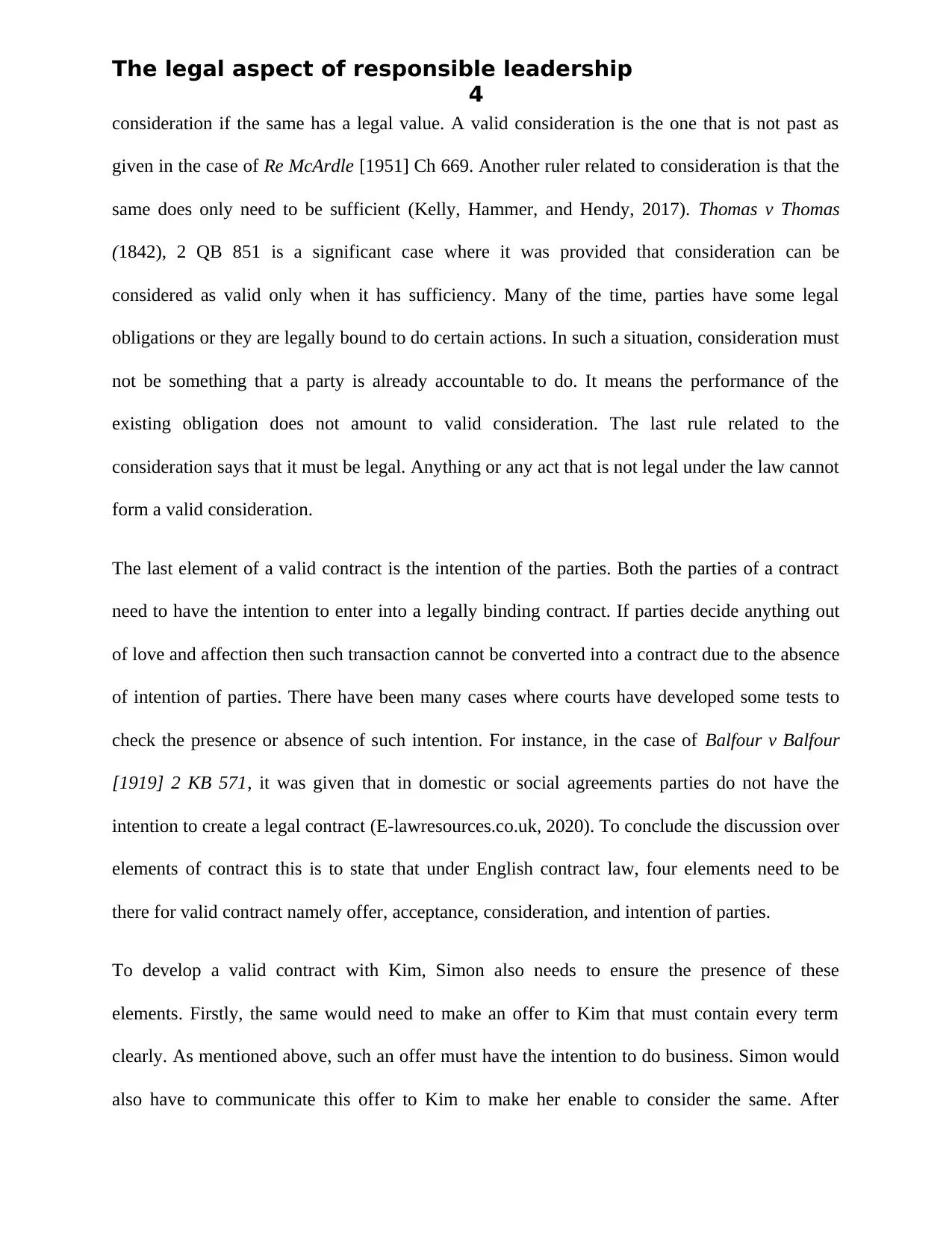
The legal aspect of responsible leadership
4
consideration if the same has a legal value. A valid consideration is the one that is not past as
given in the case of Re McArdle [1951] Ch 669. Another ruler related to consideration is that the
same does only need to be sufficient (Kelly, Hammer, and Hendy, 2017). Thomas v Thomas
(1842), 2 QB 851 is a significant case where it was provided that consideration can be
considered as valid only when it has sufficiency. Many of the time, parties have some legal
obligations or they are legally bound to do certain actions. In such a situation, consideration must
not be something that a party is already accountable to do. It means the performance of the
existing obligation does not amount to valid consideration. The last rule related to the
consideration says that it must be legal. Anything or any act that is not legal under the law cannot
form a valid consideration.
The last element of a valid contract is the intention of the parties. Both the parties of a contract
need to have the intention to enter into a legally binding contract. If parties decide anything out
of love and affection then such transaction cannot be converted into a contract due to the absence
of intention of parties. There have been many cases where courts have developed some tests to
check the presence or absence of such intention. For instance, in the case of Balfour v Balfour
[1919] 2 KB 571, it was given that in domestic or social agreements parties do not have the
intention to create a legal contract (E-lawresources.co.uk, 2020). To conclude the discussion over
elements of contract this is to state that under English contract law, four elements need to be
there for valid contract namely offer, acceptance, consideration, and intention of parties.
To develop a valid contract with Kim, Simon also needs to ensure the presence of these
elements. Firstly, the same would need to make an offer to Kim that must contain every term
clearly. As mentioned above, such an offer must have the intention to do business. Simon would
also have to communicate this offer to Kim to make her enable to consider the same. After
4
consideration if the same has a legal value. A valid consideration is the one that is not past as
given in the case of Re McArdle [1951] Ch 669. Another ruler related to consideration is that the
same does only need to be sufficient (Kelly, Hammer, and Hendy, 2017). Thomas v Thomas
(1842), 2 QB 851 is a significant case where it was provided that consideration can be
considered as valid only when it has sufficiency. Many of the time, parties have some legal
obligations or they are legally bound to do certain actions. In such a situation, consideration must
not be something that a party is already accountable to do. It means the performance of the
existing obligation does not amount to valid consideration. The last rule related to the
consideration says that it must be legal. Anything or any act that is not legal under the law cannot
form a valid consideration.
The last element of a valid contract is the intention of the parties. Both the parties of a contract
need to have the intention to enter into a legally binding contract. If parties decide anything out
of love and affection then such transaction cannot be converted into a contract due to the absence
of intention of parties. There have been many cases where courts have developed some tests to
check the presence or absence of such intention. For instance, in the case of Balfour v Balfour
[1919] 2 KB 571, it was given that in domestic or social agreements parties do not have the
intention to create a legal contract (E-lawresources.co.uk, 2020). To conclude the discussion over
elements of contract this is to state that under English contract law, four elements need to be
there for valid contract namely offer, acceptance, consideration, and intention of parties.
To develop a valid contract with Kim, Simon also needs to ensure the presence of these
elements. Firstly, the same would need to make an offer to Kim that must contain every term
clearly. As mentioned above, such an offer must have the intention to do business. Simon would
also have to communicate this offer to Kim to make her enable to consider the same. After
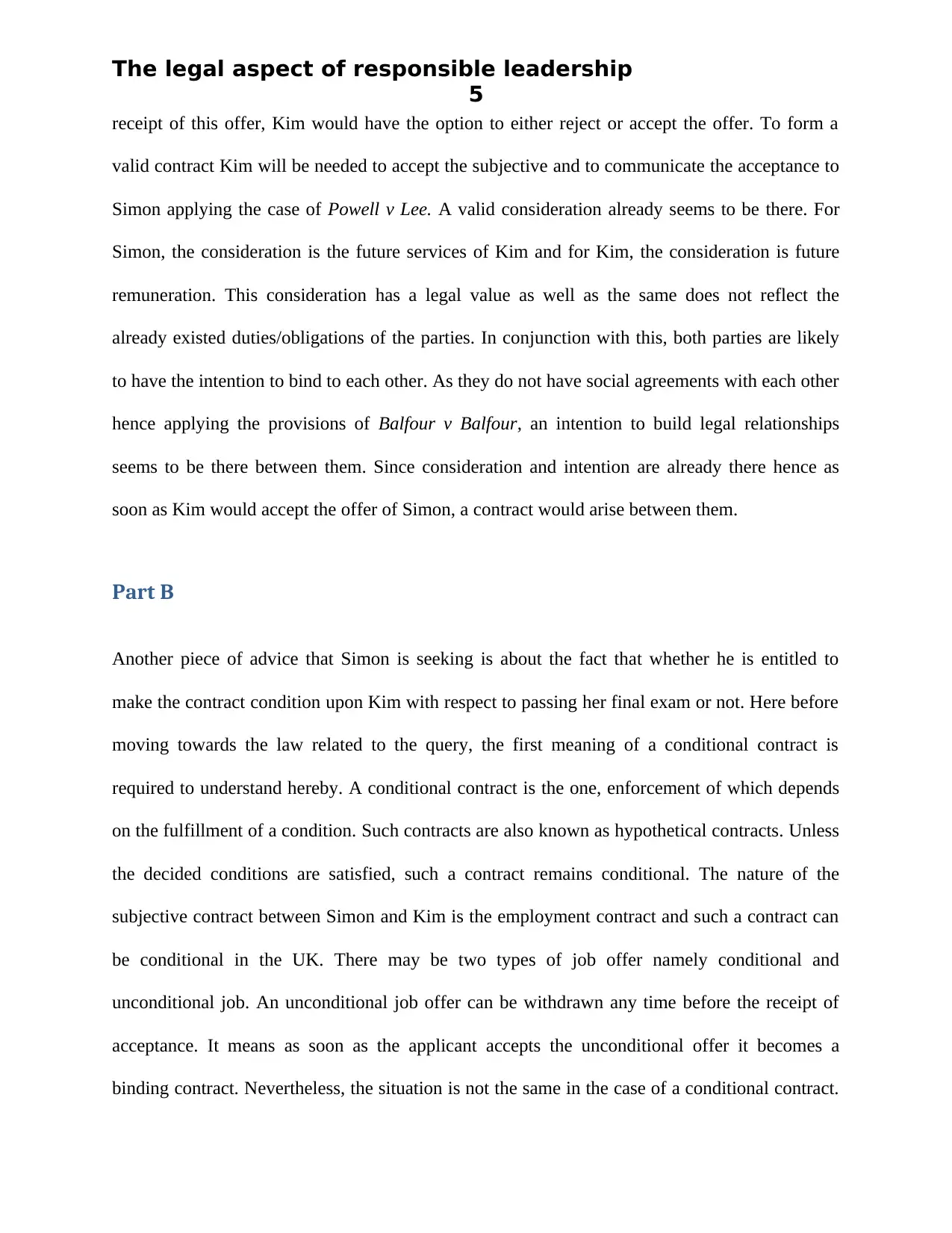
The legal aspect of responsible leadership
5
receipt of this offer, Kim would have the option to either reject or accept the offer. To form a
valid contract Kim will be needed to accept the subjective and to communicate the acceptance to
Simon applying the case of Powell v Lee. A valid consideration already seems to be there. For
Simon, the consideration is the future services of Kim and for Kim, the consideration is future
remuneration. This consideration has a legal value as well as the same does not reflect the
already existed duties/obligations of the parties. In conjunction with this, both parties are likely
to have the intention to bind to each other. As they do not have social agreements with each other
hence applying the provisions of Balfour v Balfour, an intention to build legal relationships
seems to be there between them. Since consideration and intention are already there hence as
soon as Kim would accept the offer of Simon, a contract would arise between them.
Part B
Another piece of advice that Simon is seeking is about the fact that whether he is entitled to
make the contract condition upon Kim with respect to passing her final exam or not. Here before
moving towards the law related to the query, the first meaning of a conditional contract is
required to understand hereby. A conditional contract is the one, enforcement of which depends
on the fulfillment of a condition. Such contracts are also known as hypothetical contracts. Unless
the decided conditions are satisfied, such a contract remains conditional. The nature of the
subjective contract between Simon and Kim is the employment contract and such a contract can
be conditional in the UK. There may be two types of job offer namely conditional and
unconditional job. An unconditional job offer can be withdrawn any time before the receipt of
acceptance. It means as soon as the applicant accepts the unconditional offer it becomes a
binding contract. Nevertheless, the situation is not the same in the case of a conditional contract.
5
receipt of this offer, Kim would have the option to either reject or accept the offer. To form a
valid contract Kim will be needed to accept the subjective and to communicate the acceptance to
Simon applying the case of Powell v Lee. A valid consideration already seems to be there. For
Simon, the consideration is the future services of Kim and for Kim, the consideration is future
remuneration. This consideration has a legal value as well as the same does not reflect the
already existed duties/obligations of the parties. In conjunction with this, both parties are likely
to have the intention to bind to each other. As they do not have social agreements with each other
hence applying the provisions of Balfour v Balfour, an intention to build legal relationships
seems to be there between them. Since consideration and intention are already there hence as
soon as Kim would accept the offer of Simon, a contract would arise between them.
Part B
Another piece of advice that Simon is seeking is about the fact that whether he is entitled to
make the contract condition upon Kim with respect to passing her final exam or not. Here before
moving towards the law related to the query, the first meaning of a conditional contract is
required to understand hereby. A conditional contract is the one, enforcement of which depends
on the fulfillment of a condition. Such contracts are also known as hypothetical contracts. Unless
the decided conditions are satisfied, such a contract remains conditional. The nature of the
subjective contract between Simon and Kim is the employment contract and such a contract can
be conditional in the UK. There may be two types of job offer namely conditional and
unconditional job. An unconditional job offer can be withdrawn any time before the receipt of
acceptance. It means as soon as the applicant accepts the unconditional offer it becomes a
binding contract. Nevertheless, the situation is not the same in the case of a conditional contract.
⊘ This is a preview!⊘
Do you want full access?
Subscribe today to unlock all pages.

Trusted by 1+ million students worldwide
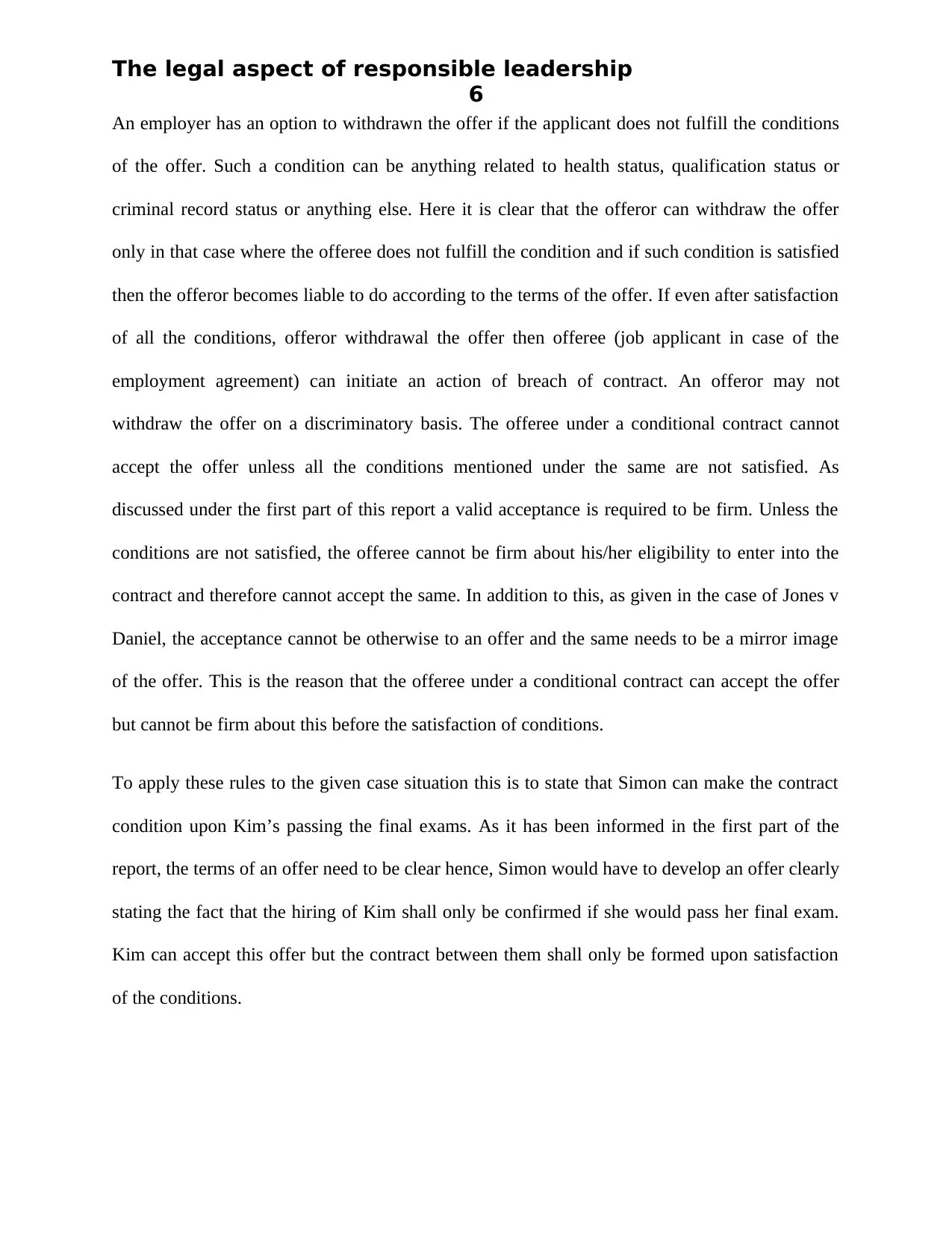
The legal aspect of responsible leadership
6
An employer has an option to withdrawn the offer if the applicant does not fulfill the conditions
of the offer. Such a condition can be anything related to health status, qualification status or
criminal record status or anything else. Here it is clear that the offeror can withdraw the offer
only in that case where the offeree does not fulfill the condition and if such condition is satisfied
then the offeror becomes liable to do according to the terms of the offer. If even after satisfaction
of all the conditions, offeror withdrawal the offer then offeree (job applicant in case of the
employment agreement) can initiate an action of breach of contract. An offeror may not
withdraw the offer on a discriminatory basis. The offeree under a conditional contract cannot
accept the offer unless all the conditions mentioned under the same are not satisfied. As
discussed under the first part of this report a valid acceptance is required to be firm. Unless the
conditions are not satisfied, the offeree cannot be firm about his/her eligibility to enter into the
contract and therefore cannot accept the same. In addition to this, as given in the case of Jones v
Daniel, the acceptance cannot be otherwise to an offer and the same needs to be a mirror image
of the offer. This is the reason that the offeree under a conditional contract can accept the offer
but cannot be firm about this before the satisfaction of conditions.
To apply these rules to the given case situation this is to state that Simon can make the contract
condition upon Kim’s passing the final exams. As it has been informed in the first part of the
report, the terms of an offer need to be clear hence, Simon would have to develop an offer clearly
stating the fact that the hiring of Kim shall only be confirmed if she would pass her final exam.
Kim can accept this offer but the contract between them shall only be formed upon satisfaction
of the conditions.
6
An employer has an option to withdrawn the offer if the applicant does not fulfill the conditions
of the offer. Such a condition can be anything related to health status, qualification status or
criminal record status or anything else. Here it is clear that the offeror can withdraw the offer
only in that case where the offeree does not fulfill the condition and if such condition is satisfied
then the offeror becomes liable to do according to the terms of the offer. If even after satisfaction
of all the conditions, offeror withdrawal the offer then offeree (job applicant in case of the
employment agreement) can initiate an action of breach of contract. An offeror may not
withdraw the offer on a discriminatory basis. The offeree under a conditional contract cannot
accept the offer unless all the conditions mentioned under the same are not satisfied. As
discussed under the first part of this report a valid acceptance is required to be firm. Unless the
conditions are not satisfied, the offeree cannot be firm about his/her eligibility to enter into the
contract and therefore cannot accept the same. In addition to this, as given in the case of Jones v
Daniel, the acceptance cannot be otherwise to an offer and the same needs to be a mirror image
of the offer. This is the reason that the offeree under a conditional contract can accept the offer
but cannot be firm about this before the satisfaction of conditions.
To apply these rules to the given case situation this is to state that Simon can make the contract
condition upon Kim’s passing the final exams. As it has been informed in the first part of the
report, the terms of an offer need to be clear hence, Simon would have to develop an offer clearly
stating the fact that the hiring of Kim shall only be confirmed if she would pass her final exam.
Kim can accept this offer but the contract between them shall only be formed upon satisfaction
of the conditions.
Paraphrase This Document
Need a fresh take? Get an instant paraphrase of this document with our AI Paraphraser
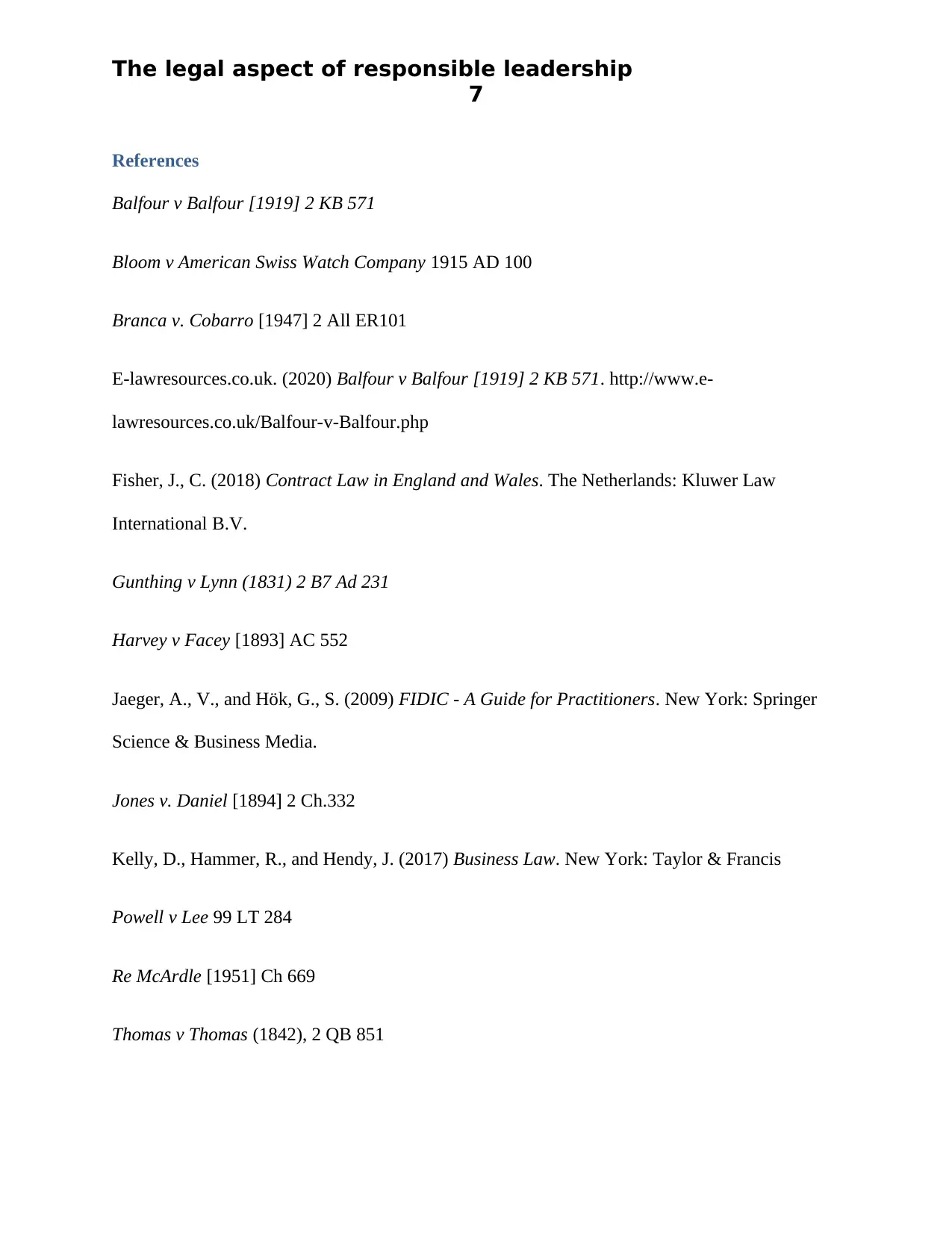
The legal aspect of responsible leadership
7
References
Balfour v Balfour [1919] 2 KB 571
Bloom v American Swiss Watch Company 1915 AD 100
Branca v. Cobarro [1947] 2 All ER101
E-lawresources.co.uk. (2020) Balfour v Balfour [1919] 2 KB 571. http://www.e-
lawresources.co.uk/Balfour-v-Balfour.php
Fisher, J., C. (2018) Contract Law in England and Wales. The Netherlands: Kluwer Law
International B.V.
Gunthing v Lynn (1831) 2 B7 Ad 231
Harvey v Facey [1893] AC 552
Jaeger, A., V., and Hök, G., S. (2009) FIDIC - A Guide for Practitioners. New York: Springer
Science & Business Media.
Jones v. Daniel [1894] 2 Ch.332
Kelly, D., Hammer, R., and Hendy, J. (2017) Business Law. New York: Taylor & Francis
Powell v Lee 99 LT 284
Re McArdle [1951] Ch 669
Thomas v Thomas (1842), 2 QB 851
7
References
Balfour v Balfour [1919] 2 KB 571
Bloom v American Swiss Watch Company 1915 AD 100
Branca v. Cobarro [1947] 2 All ER101
E-lawresources.co.uk. (2020) Balfour v Balfour [1919] 2 KB 571. http://www.e-
lawresources.co.uk/Balfour-v-Balfour.php
Fisher, J., C. (2018) Contract Law in England and Wales. The Netherlands: Kluwer Law
International B.V.
Gunthing v Lynn (1831) 2 B7 Ad 231
Harvey v Facey [1893] AC 552
Jaeger, A., V., and Hök, G., S. (2009) FIDIC - A Guide for Practitioners. New York: Springer
Science & Business Media.
Jones v. Daniel [1894] 2 Ch.332
Kelly, D., Hammer, R., and Hendy, J. (2017) Business Law. New York: Taylor & Francis
Powell v Lee 99 LT 284
Re McArdle [1951] Ch 669
Thomas v Thomas (1842), 2 QB 851
1 out of 8
Related Documents
Your All-in-One AI-Powered Toolkit for Academic Success.
+13062052269
info@desklib.com
Available 24*7 on WhatsApp / Email
![[object Object]](/_next/static/media/star-bottom.7253800d.svg)
Unlock your academic potential
Copyright © 2020–2026 A2Z Services. All Rights Reserved. Developed and managed by ZUCOL.




